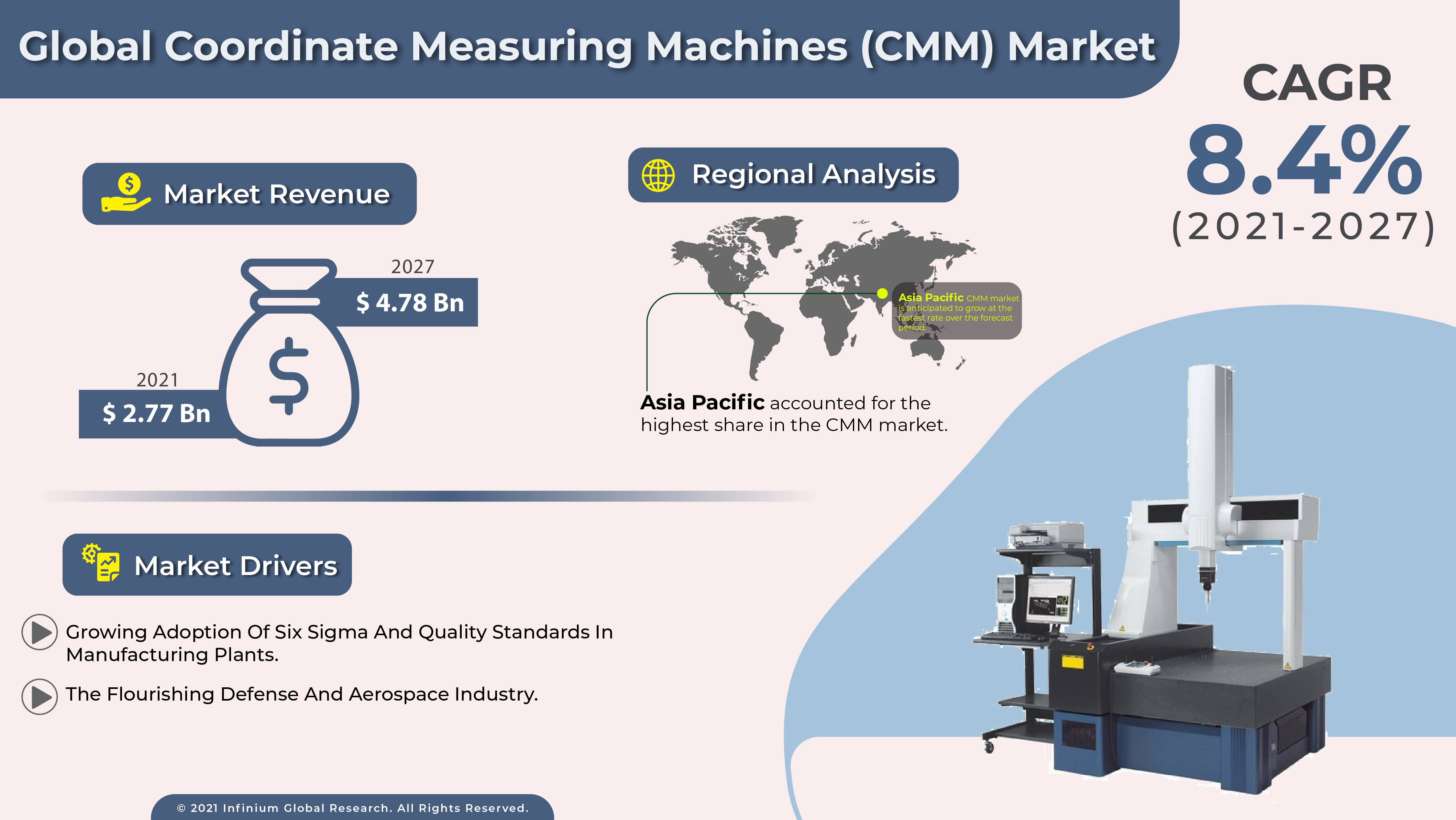Coordinate Measuring Machines (CMM) Market (Type - Stationary, and Portable; End User - Automotive, Aerospace & Defense, Energy & Power, Electronics, and Others): Global Industry Analysis, Trends, Size, Share and Forecasts to 2027
A recent report published by
Infinium Global Research on coordinate measuring machines (CMM) market provides an in-depth analysis of segments and sub-segments in the global as well as
regional coordinate measuring machines (CMM) market. The study also highlights
the impact of drivers, restraints, and macro indicators on the global and
regional coordinate measuring machines (CMM) market over the short term as well
as long term. The report is a comprehensive presentation of trends, forecast
and dollar values of global coordinate measuring machines (CMM) market.
According to the report, the global coordinate measuring machines (CMM) market
is projected to grow at a CAGR of 8.4% over the forecast period of 2021-2027,
growing from nearly USD 2.77 billion in 2020 to about USD 4.78 billion in 2027.

Market Insight
Coordinate measuring machines (CMM)
are used to measure the geometrical dimensions of objects by sensing discrete
points on the surface of the object by a probe. The CMM comes with different
types of probes, including mechanical, optical, laser, and white light. The
probe is controlled either manually by an operator or a computer-controlled
arm. CMMs are generally made of four major components including computer
control system, machine, software, and probe contact or probe non-contact.
These measuring machines have precision measuring capabilities, giving
high-resolution measurements. Due to their high accuracy, several manufacturing
companies use CMMs to inspect their products. Companies from industries such as
automotive, aerospace, energy & power, electronics, and, others widely use CMM
for product inspection. Furthermore, the market players are developing
innovative CMM prototypes to gain a tactical advantage over the competition.
The spread of
COVID-19 negatively affected the CMM market over the short term. Government in
several countries across the world imposed restrictions to control the
pandemic. Many local and national governments implemented lockdowns, compelling
industries to reduce or even stop the business operations. This, in turn,
reduced the demand for industrial equipment such as CMMs, which are used in
manufacturing plants. Moreover, the lockdown restrictions by the governments
disrupted the supply chains across the world. Ports and warehouses in many
countries were closed during the pandemic, which in turn, affected the
transport and supply of raw materials and finished goods. Thus, countries
dependent on the import of machinery, and equipment registered shortages over
the period of the pandemic. This, in turn, hampered the growth of the CMM
market during the pandemic. However, as the pandemic crisis got under control,
the markets opened up and the sale of CMM began to come back to the
pre-pandemic state.
The growing adoption of six sigma
and quality standards in manufacturing plants is mainly driving technological
advancements. Manufacturing plants across several industries are implementing
modern product development processes to improve operational efficiencies. This,
in turn, boosts the growth of the CMM market. Moreover, the flourishing defense
and aerospace industry is expected to augment the demand for CMM. The
components used in the defense and aerospace industry are required to be of
highly accurate dimensions. Thus, CMMs play an important role in inspecting the
components used in the defense and aerospace industry. However, the
availability of alternative measuring machines is likely to hinder market
growth over a short period. Nevertheless, the growing trend of industrial
automation is anticipated to boost the market in the future. Modern
technologies such as cloud computing, and IIoT offer growth opportunities to
the market players.
The Asia Pacific accounted for the
highest share in the CMM market among other regions in the world. Moreover, the
Asia Pacific CMM market is anticipated to grow at the fastest rate over the
forecast period as compared to other regional markets. The growing number of
manufacturing units built in the region is majorly driving the growth of the
market. furthermore, the increasing investment for infrastructure development
by the government and private players is further supporting the growth of the
Asia Pacific CMM market. On the other hand, North America accounted for the
second-largest share in the global CMM market. The presence of major
manufacturing plants in the region is augmenting the growth of the North
American CMM market.
Segment Covered
The report on global coordinate
measuring machines (CMM) market covers segments such as type, and end user. On
the basis of type, the sub-markets include stationary, and portable. On the
basis of end user, the sub-markets include automotive, aerospace & defense,
energy & power, electronics, and others.
Companies Profiled:
The report provides profiles of
the companies in the market such as CMM Solutions (UK) Ltd., Carl Zeiss AG
(Zeiss Group), Ametek Inc. (Creaform), Faro Technologies, Inc., Nikon
Corporation, Keyence Corporation, Wenzel Group GmbH & Co. KG, Eley
Metrology Ltd., Hexagon AB, and Sipcon Instrument Industries.
Report Highlights:
The report provides deep insights
into the demand forecasts, market trends, and micro and macro indicators. In
addition, this report provides insights into the factors that are driving and
restraining the growth in this market. Moreover, The IGR-Growth Matrix analysis
given in the report brings an insight into the investment areas that existing
or new market players can consider. The report provides insights into the
market using analytical tools such as Porter's five forces analysis and DRO
analysis of coordinate measuring machines (CMM) market. Moreover, the study
highlights current market trends and provides forecast from 2021-2027. We also
have highlighted future trends in the market that will affect the demand during
the forecast period. Moreover, the competitive analysis given in each regional
market brings an insight into the market share of the leading players.
